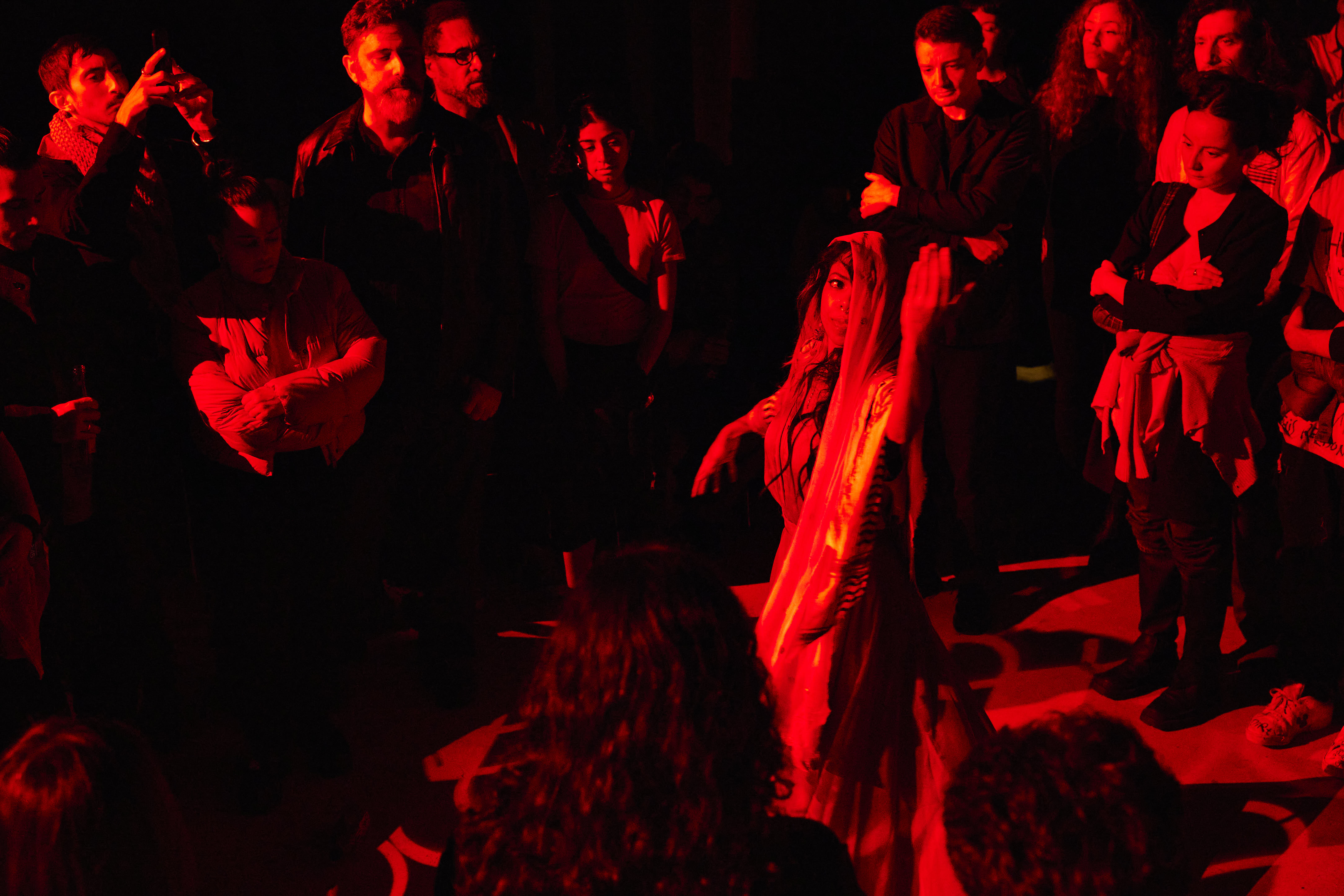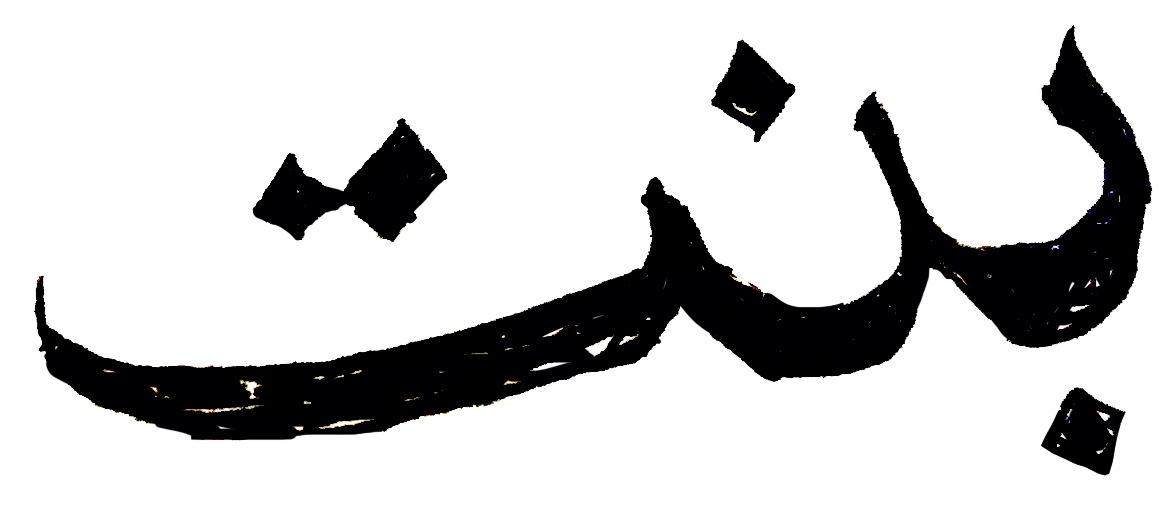SOLVE ET COAGULA → عيب, Stage III: حمراء (The Reddening)
2023Following the series’ sem‘a-inspired framework, this final stage responded to the communal grief of the moment — two months into the most recent wave of unrelenting bombardments and systematic horrors against Palestinians in Gaza. It is in this stage that rhythm is experienced and heard for the first time. In live collaboration with tabla player Roshni Samlal, BINT layered electronics, voice, and real-time sampling within folk taals and dhamaal traditions of the sufi shrine of the Red Saint. Singing an experimental rendition of an Urdu poem by Pakistani revolutionary writer Faiz Ahmad Faiz, and activating the space with original film projections, BINT transformed the all-red room into an immersive environment where grief gave way to rhythm and movement.
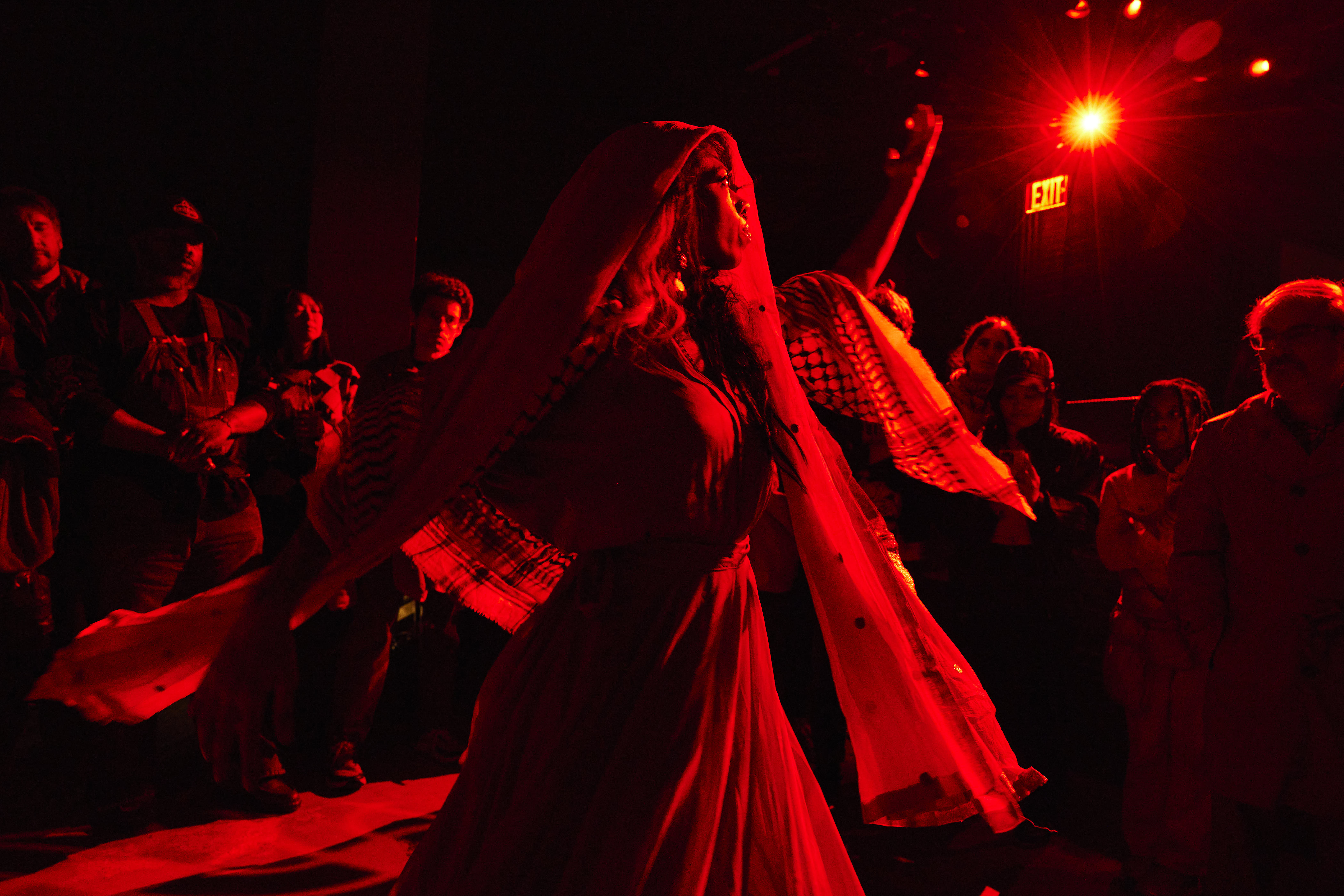
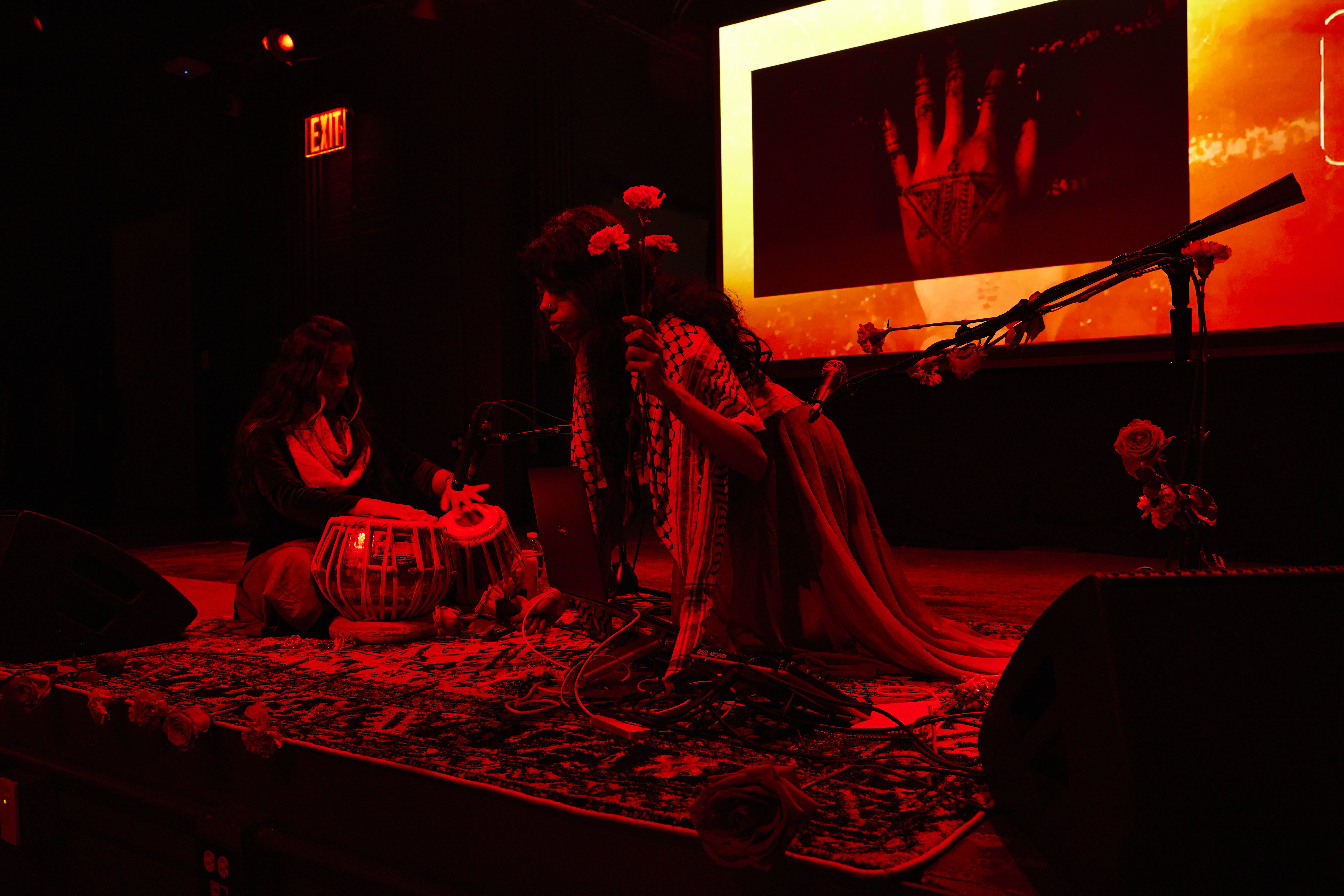
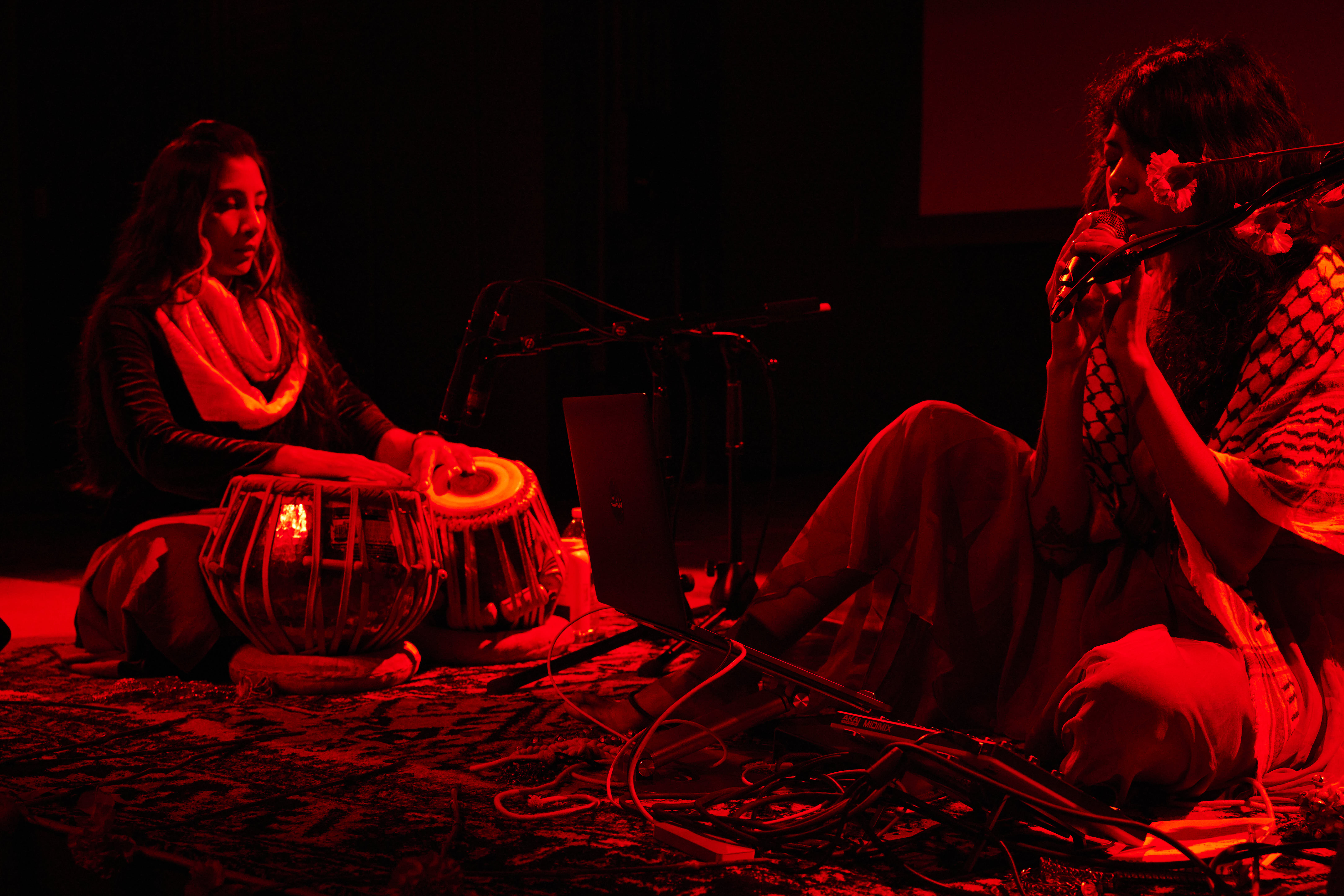
SOLVE ET COAGULA → عيب, Stage III: حمراء (The Reddening), 2023
Sound art and ritual performance (movement, video projections, cassette tape loops)
Running time: 23 minutes, 10 seconds
NYU Brooklyn – "The Garage", Brooklyn, NY, USA
In collaboration with Roshni Samlal (tabla)
Presented by ISSUE Project Room
December 12, 2024
Sound art and ritual performance (movement, video projections, cassette tape loops)
Running time: 23 minutes, 10 seconds
NYU Brooklyn – "The Garage", Brooklyn, NY, USA
In collaboration with Roshni Samlal (tabla)
Presented by ISSUE Project Room
December 12, 2024
Created during the height of the ongoing atrocities in Gaza, The Reddening anchored itself in Palestine — opening as a container to hold collective grief, outrage, and solidarity. Visual and sonic samples from Gaza — footage, voices, and fragments of reports from journalists many in the audience followed closely — filled the room, grounding the performance in the immediacy of the moment. Rather than remain in mourning, the work transformed this weight into movement and resistance, a call to gather strength together.
Collaborating with renowned tabla player Roshni Samlal, BINT built a live, rhythm-centered environment where percussion, electronics, voice, and real-time sampling wove together. As South Asian diasporic artists, both drew on the deep traditions of resistance in their homelands — where struggles against colonial and military occupation have long stood in solidarity with Palestine. BINT performed an vocally experimental rendition of آج بازار میں (“Today in the Market-Place”) by revolutionary poet Faiz Ahmad Faiz (1911–1984), set to the iconic composition by Nayyara Noor (1950–2022), carrying its spirit of defiance into the present moment.
The soundscape drew on dhamaal traditions — the ecstatic, devotional gatherings around Lal Shahbaz Qalandar (QAS), the “Red Saint” of Sindh — infusing the space with dhols, chanting, and specific folk taals played live on tabla. BINT collaborated within these taals using field recordings and live sampling, weaving them with electronics and voice to build layers of rhythm and resonance. Red lighting and projections turned the room into a glowing, charged environtment where heartbeats, drumbeats, and sampled sounds quickened together, pushing the audience toward collective motion.
As the piece built toward its final peak, ritual movements — chants, dhol beats, whirling — pulled the audience out of stillness and into activation. The performance ended without resolution, leaving participants in a heightened, “red” state — carrying the fire of rhythm, resistance, and solidarity back into the world beyond the performance space.
![]()
Notes from BINT on Stage III: حمراء (The Reddening):
This year culminates with the final stage of transmutation, ‘The Reddening’ (حمراء). This last program is inspired by dhamaal, a lively South Asian type of sem’a, highlighting rhythm and movement.
The past two months have weighed heavy on the world as the events in Gaza have continued to escalate to horrific levels of heartbreak and helplessness everyday. Any impulse to create, make music, even “celebration as an affront” mentioned in the original press release, has been impossible. The only way I could pull through with the show as scheduled is to create a space to gather and channel the red feelings I, we, many of us have been grappling with.
Reddening, less as passionate celebration and more as liberation. The visceral answer of what it is to resist, to unite in solidarity in the face of oppression. Rhythms of resistance. Movement as resistance.
The container of this series has been transmuting collective shame from stories submitted by SWANA folks in diaspora. Some of this will inherently be part of the gathering but I’ve opted to finish working those privately in order to hold space in this way.
![]()
ABOUT THE SERIES
BINT has been collecting anonymous experiences of shame from folks of the SWANA (South West Asian / North African) diaspora. These communally-individual experiences will be the focus of her 2023 residency she is naming "عيب:Solve et Coagula.” Over the course of the year, she will be presenting three commissioned programs mirroring the primary stages of (Arabic) alchemical transmutation. All three programs will be audiovisual immersive sound rituals loosely based on the structure and setting of Sufi sem’a gatherings, in which these collective experiences of shame are transmuted through sound and ritual processing, as experienced through the audience. Sem'a is a traditional Sufi gathering in which a third communal space is created (often underground hidden from orthodox authorities) for active deep listening and collective participatory expressions of devotional music, chanting, and rhythm.
Collaborating with renowned tabla player Roshni Samlal, BINT built a live, rhythm-centered environment where percussion, electronics, voice, and real-time sampling wove together. As South Asian diasporic artists, both drew on the deep traditions of resistance in their homelands — where struggles against colonial and military occupation have long stood in solidarity with Palestine. BINT performed an vocally experimental rendition of آج بازار میں (“Today in the Market-Place”) by revolutionary poet Faiz Ahmad Faiz (1911–1984), set to the iconic composition by Nayyara Noor (1950–2022), carrying its spirit of defiance into the present moment.
The soundscape drew on dhamaal traditions — the ecstatic, devotional gatherings around Lal Shahbaz Qalandar (QAS), the “Red Saint” of Sindh — infusing the space with dhols, chanting, and specific folk taals played live on tabla. BINT collaborated within these taals using field recordings and live sampling, weaving them with electronics and voice to build layers of rhythm and resonance. Red lighting and projections turned the room into a glowing, charged environtment where heartbeats, drumbeats, and sampled sounds quickened together, pushing the audience toward collective motion.
As the piece built toward its final peak, ritual movements — chants, dhol beats, whirling — pulled the audience out of stillness and into activation. The performance ended without resolution, leaving participants in a heightened, “red” state — carrying the fire of rhythm, resistance, and solidarity back into the world beyond the performance space.

Notes from BINT on Stage III: حمراء (The Reddening):
This year culminates with the final stage of transmutation, ‘The Reddening’ (حمراء). This last program is inspired by dhamaal, a lively South Asian type of sem’a, highlighting rhythm and movement.
The past two months have weighed heavy on the world as the events in Gaza have continued to escalate to horrific levels of heartbreak and helplessness everyday. Any impulse to create, make music, even “celebration as an affront” mentioned in the original press release, has been impossible. The only way I could pull through with the show as scheduled is to create a space to gather and channel the red feelings I, we, many of us have been grappling with.
Reddening, less as passionate celebration and more as liberation. The visceral answer of what it is to resist, to unite in solidarity in the face of oppression. Rhythms of resistance. Movement as resistance.
The container of this series has been transmuting collective shame from stories submitted by SWANA folks in diaspora. Some of this will inherently be part of the gathering but I’ve opted to finish working those privately in order to hold space in this way.
